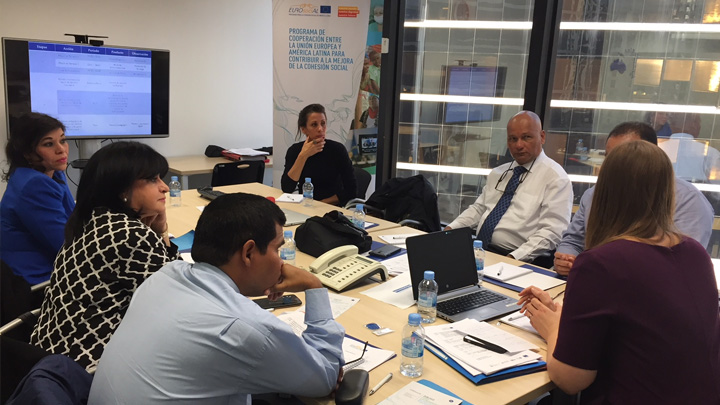We interviewed Greta Marchosky, Superior Appellate Judge from Panama and Moisés Carvajal, Public Counsel for Victims, during their visit to the European Union to learn about best practices in the fiel

Within the framework of support for Panama in identifying and treating the risks resulting from dissociation by women who have been victims of violence, we interviewed Greta Marchosky, Superior Appellate Judge from Panama and Moisés Carvajal, Public Counsel for Victims, during their visit to the European Union to learn about best practices in the field.
What is the situation in the fight against gender-based violence in Panama?
Moisés Carvajal (MC): Panama is committed to combating gender-based violence and crimes against women. Panama is a signatory to every international convention on this issue and it has a law on femicide that was passed two years ago. This law also defines other offences in order to protect women such as psychological violence, which is different from domestic violence, and economic and property violence against women, which are different from the violence that occurs within the family. This ensures that women also feel protected outside their family nucleus.
Panama has also created Victims’ Defence, a group of lawyers within the judicial body who are exclusively responsible for assisting victims of gender-based violence.
Greta Marchosky (GM): Panama, which has ratified the international conventions defending human rights and specifically women’s rights, has focused on avoiding domestic violence through prevention and punishment. A law on femicide has been passed, which in addition to criminalising the crime against a woman, defined as homicide in the degree of femicide, has established a council (comprising the Public Prosecutor’s Office, the Judicial Body, Women’s Institute and others such as the Ministry of Health) to establish policies to prevent domestic violence and assist women in these cases.
The initiatives in Panama include the implementation of the Department for Legal Advice, what is its function?
MC: the Department for Legal Advice is free for victims of crime who are engaged in a judicial process, it is composed of a group of lawyers who are dedicated to caring for victims. Our functions include providing legal guidance and advice on their rights and also on their duties within the criminal legal framework. We explain the type of crime they have suffered, accompanying them if required to file a complaint, accompanying them to pre-trial hearings and, if the victim wishes to continue with the process, she can ask that we become part of the process as complainants.
In addition, since a 2017 law, a group of lawyers, Public Defenders within the Judicial Body, has been created for civil claims by victims of crime, since our function ends when a sentence is passed, even when it is a conviction, but the victim must go to civil proceedings for compensation, and that is another jurisdiction. To this end, the law provides for this group of lawyers to assist the victim in gaining compensation for the crime. The implementation of this service has already been included in next year’s budget.
GM: We have seen quite active work by the Victims’ Advocacy Office in the hearings, first before the Magistrate Judge and also before the High Court of Appeal composed of three judges in each chamber. The victim is represented, allowed to speak and describe her feelings, listened to and then, through the effective representation of the Victim Advocacy Office, the Magistrates take the victim into consideration in their judgement.
What is the goal of EUROsociAL’s support and what do you hope to achieve with this exchange?
GM: EUROsociAL’s support is vital as it gives us access to experts who, through protocols and advisory services, can facilitate the development of internal policies to prevent domestic violence and provide access to justice for the people who require our judicial system. With EUROsociAL we can develop these policies, in fact, we already have very interesting products that are being considered by the Judicial Body, such as for example a diagnosis of the situation that will be very useful for us as a frame of reference.
MC: EUROsociAL has already supported Panama in previous actions and protocols are now in place with the Police, Women’s Institute and the Public Prosecutor’s Office for redress when a crime is committed. Against this background, the Victim’s Department proposed requesting this support as a result of an element that concerned us, namely the situation of victims of crime who dissociate themselves from the process. EUROsociAL has the tools and it provides the appropriate international experts to facilitate the development of the instruments that can resolve this situation because a victim that dissociates from the process is at greater risk. This is something we want to reduce, keeping the victim in the process and at a lower risk of this type of crime and the aggressor. EUROsociAL complements this support by preparing a best practice protocol for use by other Panamanian institutions to find a way in which the victim remains within the process and reaches its conclusion.
Your exchange visit to Europe starts in Spain with institutions in the Madrid and Andalusia regions, what do you expect to gain from this exchange visit?
MC: the aim is to be able to see in situ how this care for victims of crime works in Spain and to bring new and interesting ideas to Panama to benefit victims.
GM: to see and witness the good practices in Spain in the fight against violence against women and the care of victims, in order to replicate them in our country. Also the inter-institutional coordination addressed in this action with EUROsociAL will bring benefits for our citizens.
EUROsociAL+



